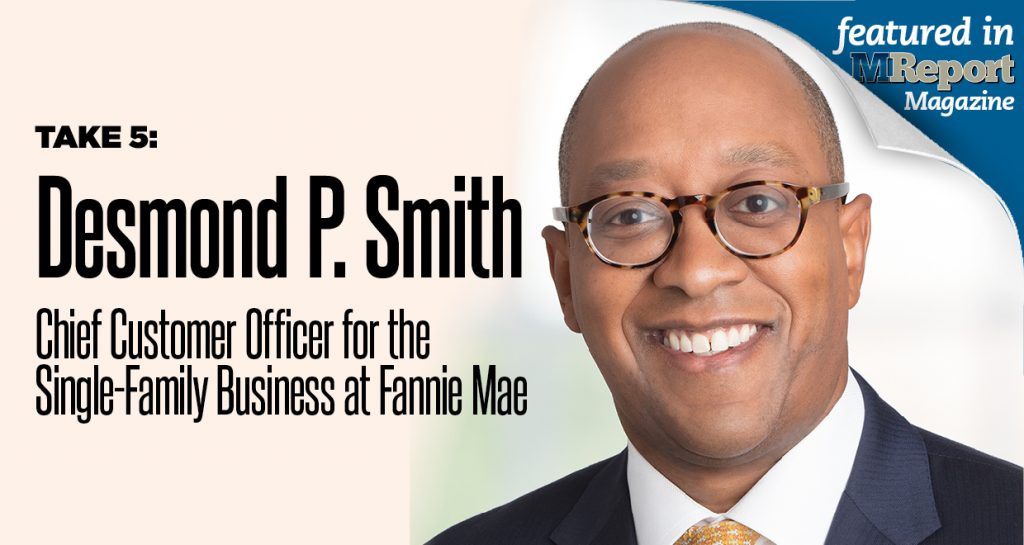
Editor’s note: This feature originally appeared in the December issue of MReport.
Desmond P. Smith currently serves as the Chief Customer Officer for the Single-Family Business at Fannie Mae. Smith is responsible for the execution and overall business performance for all of Fannie Mae’s single-family customers. Specifically, he has complete responsibility for end-to-end customer management, which includes origination, pricing, credit, strategy, operations, marketing, technology, and servicing.
Smith has over 25 years’ experience in the mortgage industry. Prior to joining Fannie Mae in August 2016, he was Production Executive at Capital One Home Loans. Before that, he served as Managing Director and National Production Executive at Citibank, SVP and National Sales Executive at JPMorgan Chase, and SVP and Program Manager at Wells Fargo.
Smith spoke with MReport at the MBA’s annual convention about new technological tools, communicating with lenders, and what he has learned during his career.
Heading into 2020, what would you say are your biggest victories for yourself and your team this year?
Within our Single-Family business and throughout Fannie Mae we have developed the tools that help our customers succeed and thrive. Our biggest successes have come about as a result of focusing on what our customers tell us their needs and concerns are. Then, we are earning their business each and every day. That’s been our biggest win – ensuring that we continue down this customer-centric, customer-focused journey.
Customers tell us, "Look, cost is important. Efficiency is important. Customer experience is extremely important." We work to provide tools and services to help them achieve those goals.
Another key initiative this year has been the roll-out of Ask Poli. Our customers said, "We need some help to navigate the selling and servicing guides." So, we built this AI tool that provides real-time answers to questions in simple terminology. Previously, our customers might spend a day or two looking for an answer. Now they’re getting it in real time.
Being able to see the questions people are asking through Ask Poli also allows us to recognize what needs to be improved in our guides for sellers and servicers.
When you're seeing these areas where you may need to make changes, what does that process look like as far transforming that into action?
We have a couple of different ways that we track all of the teams and the information that comes in. We look for the metrics, have a meeting, and from there, we go back to the customers and ask, "If we were able to deliver A, B, or C, is this going to help solve your need?"
What you don't want to do is capture some information, think it's insight, and then go with it and not validate that it actually will solve their needs. We've got a good system to capture information based on customer feedback. Then, after we look over the feedback, we create the themes and ask: "How can we help solve those challenges for our customers?"
Would you say are there any particularly key factors that you would communicate to lenders who are needing to interact with you?
What I don't want us to do is tell them what's important to them. My first question is: What are you focused on in 2020? That's most important.
Before we go too far with it, they'll come back and say, "Here are a few things we think that Fannie Mae could offer to help us solve the issue.”
I don't want to tell someone what their problem is. I want to listen to what they have to say and then figure out what we can do or create at Fannie Mae to help them address their needs.
What would you say are some of the most important lessons that you've taken away from your career thus far?
Relationships matter—that’s number one. The second thing is, if I stop talking and listen to what you tell me, you'll tell me what you need. It’s about relationships, listening, and empathy. At the end of the day, just acknowledging that there is a problem and that I actually care - that is the foundation that you build a relationship on.
I’ve been doing this for almost 30 years. It took me a while to understand that the most important thing you could do is get to know someone. Because if you get to know them, they're going to trust you enough to tell you what's going on.

 theMReport.com Your trusted source for mortgage banking news
theMReport.com Your trusted source for mortgage banking news








